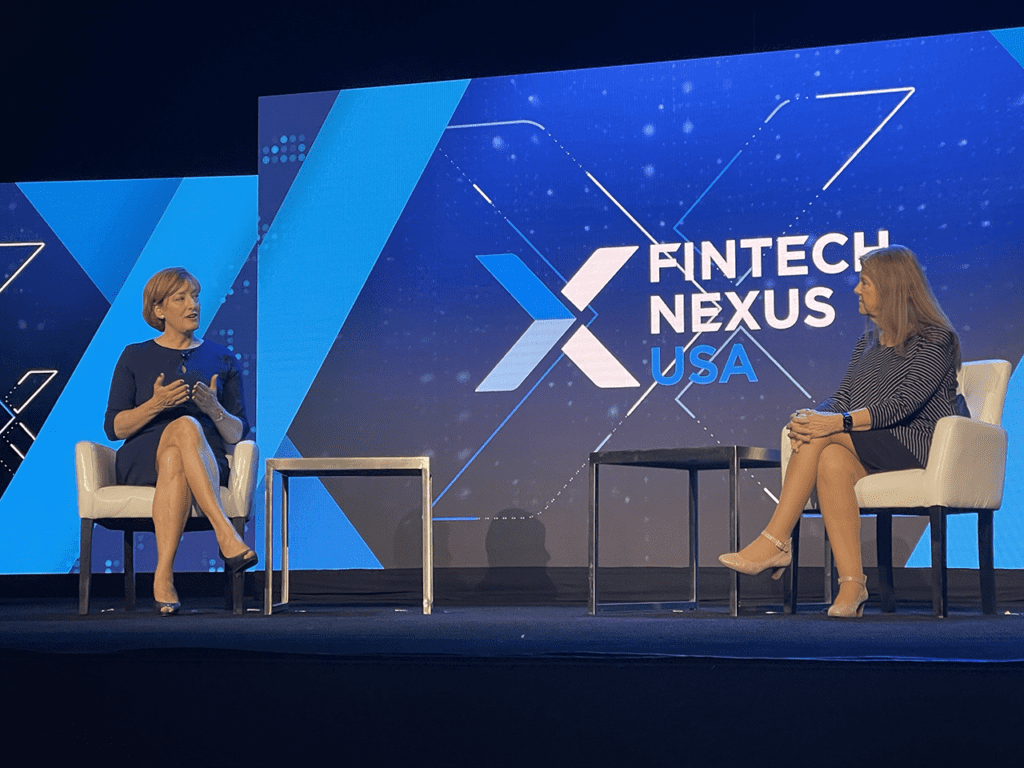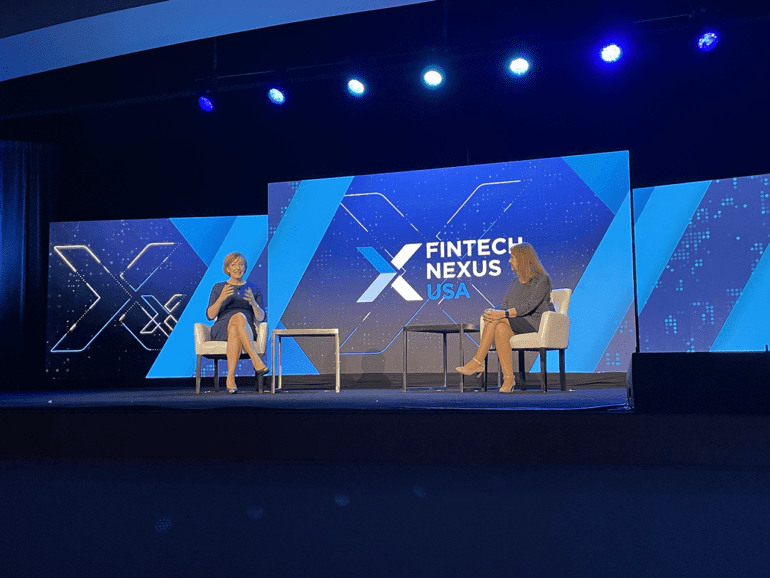NEW YORK, N.Y. — As one of the trailblazers in applying blockchain and Web3 technologies to traditional finance, Caitlin Long, CEO and founder of Custodia Bank, has had her fair share of dealings with regulators.
On Day Two of Fintech Nexus USA, Long led the “How blockchain innovators can work with regulators” keynote to shed a little light on an area that has become increasingly murky.
While she agreed that some areas of the digital asset industry needed to “burn on a raging fire until dead,” oversight of the sector was essential. Many see blockchain as having the potential to supercharge the financial system, with many building infrastructures to implement its speed, security, and cross-border advantages.
However, regulation has caused a sticking point that increasingly, in other jurisdictions, is being addressed.
She explained that although it was clear the FDIC would not insure digital asset deposits, Custodia Bank had attempted to work within existing regulatory structures to bring a different banking experience to the financial landscape.

What we’ve worked on, and what Custodia Bank is, is in this other category of a depository institution legally allowed to receive deposits in U.S. dollars,” she said.
“If you’re a depository institution, because you have the statutory authority to receive deposits, you’re not a fintech. You are, therefore, under federal law, eligible for a clearing account at the Federal Reserve. In the case of the Wyoming Special Purpose depository institution, there are special rules that you can opt into for digital assets.”
The company’s application for a master account would have allowed Custodia to serve institutional customers and access the FedWire network. Deposits would not have been FDIC insured. However, it was denied based on “heightened illicit finance and safety and soundness risks.”
However, Long highlighted that Custodia’s approach, holding excess reserves for deposits, was much more sound than other federally regulated banks that engaged in digital assets – showing a distinct lack of understanding in the regulatory space about the issue.
“The banking system can’t handle fast settlement of payments,” she said. “I was looking at the banks that were serving the digital asset industry going back to 2020 and warning that there were going to be liquidity issues with stablecoins. Why? Because I looked at the banks serving the digital asset industry, they weren’t holding less cash on their balance sheets than they were holding deposits from stablecoins.
“Unfortunately, what we had to learn the hard way is it wasn’t the assets that caused those problems. It was pure old, boring online banking.”
The rejection of Custodia Bank by the Federal Reserve, and the implicit recognition as a stand-alone federally regulated bank, was one of many moves regulators have recently made against the crypto industry’s leading entities.
The U.S. against the rest of the world
“It’s so fascinating because there’s a real bifurcation between the US and the rest of the world, said Long. “The internet doesn’t have borders. And nor does this technology, because it’s internet native technology.”
Long, coming to Fintech Nexus directly after a trip to London, explained that significant players were investigating open public blockchain’s use within traditional finance in Europe.
“They are all in on an open public blockchain,” she said. “I was first kind of curious what they were interested in, and then it hit me that they needed somebody to fight the fight for open public blockchains because the U.S. is trying to shove it all offshore.”
“They believed that if they tried to shove it out of the U.S. banking system, it would die. Holy cow, it hasn’t died. It is flourishing in a big way. Outside of the U.S.”
She explained that in jurisdictions like Europe, the regulators’ acceptance of the technology is boosting innovation and could mitigate the risks of fraud and crime that had shed a negative light on the technology.
“The U.S. has diverged massively, so if we look ahead five years, given that the U.S. has diverged massively, What’s going to happen? It’s just going to flourish offshore, and the U.S. is going to figure out that it didn’t go away like they hoped that it would.”
She said this move would likely position the U.S. negatively to compete in an increasingly digital native industry. “I think they’re gonna rue the day that they decided to try to shove the whole thing offshore and hope it went away because it isn’t going away.”
While this has meant that many jurisdictions continue focused regulation, the U.S.’s ex-communication of the technology has compounded risks.
“We’re getting exactly what the regulators fear, which is that it’s going into the shadows and exploding in size in the shadows,” said Long. She explained that the industry had seen increased activity on opaque blockchain systems known for their involvement in crime due to the lack of regulation.
While regulators had hoped their moves would stonewall the industry into nonexistence, it would likely cause more issues as the industry continued to evolve without their oversight. “Frankly, they’re playing Whac-a-Mole, as it pops up in different places causing problems,” she said.

Turning the tide
Although regulators had now taken a firm stance against digital assets, before FTX’s alleged fraud was uncovered, they were seen to be tentatively engaging in crypto regulation. Despite much opposition, Sam Bankman-Fried was the very willing spokesperson for the industry.
Long explained that this move will likely directly influence the stance.
Related:
“Unfortunately, Money talks in Washington, DC, and those of us who did not spread money around, weren’t in were at the table to discuss regulation,” she said. “And the wrong folks were being listened to. And in reaction, there’s been this overreaction to shove the whole thing offshore.”
While many regulators have opted to push the digital asset industry to different jurisdictions, a growing few are continuing the conversation. Long addressed regulators, highlighting the importance of the dialogue.
While she said it felt like a “pipedream” to have digital asset regulation in the US, she urged regulators to remember its importance. The alternative, she said, was a perpetual “wack-a-mole” of problems from an industry that continues to flourish under the radar.


